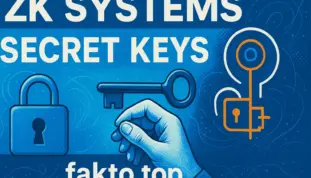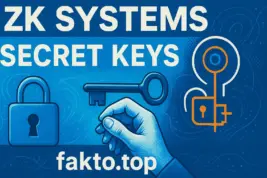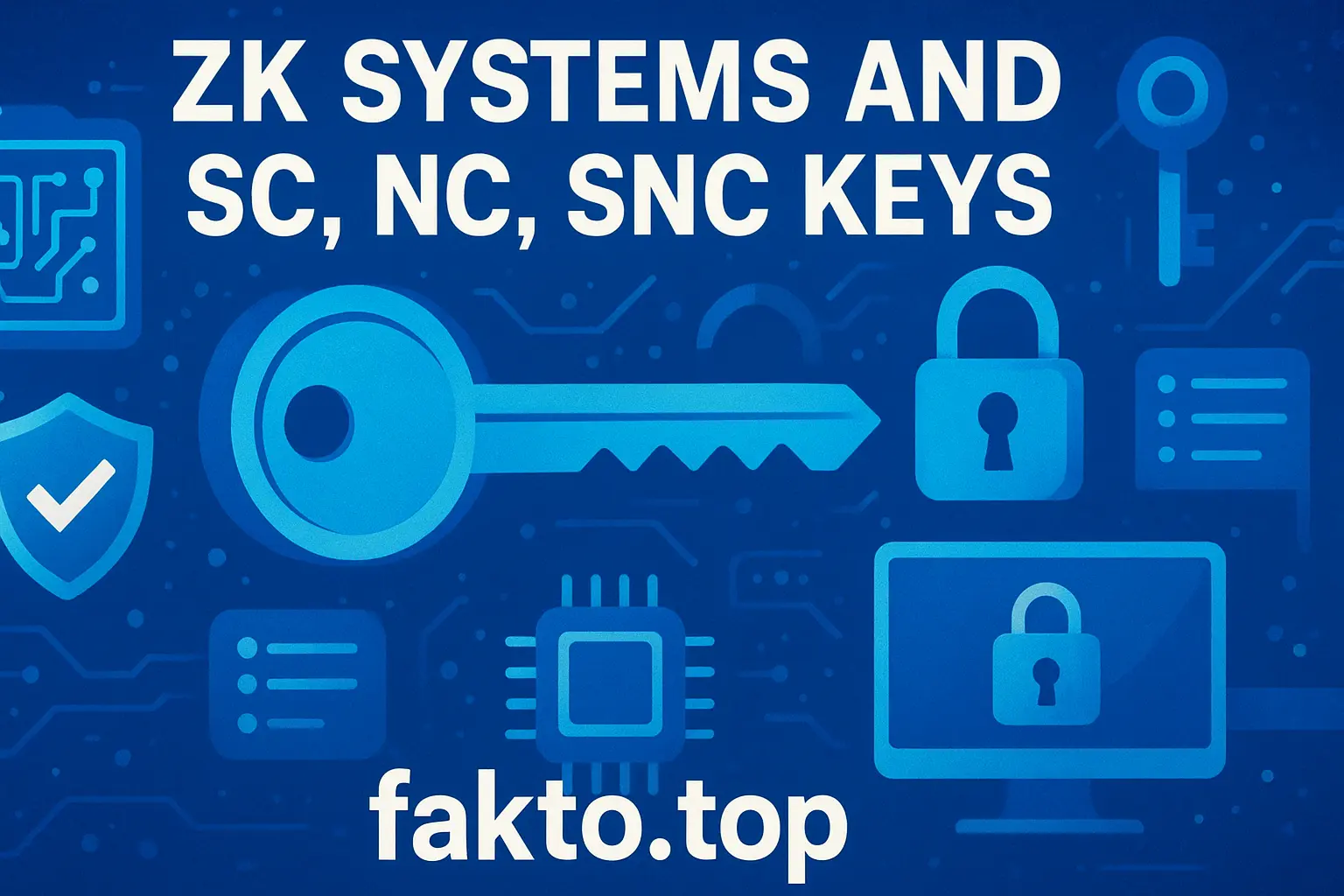ZK Systems and SC, NC, SNC Keys: A Complete Beginner’s Guide
If you’re just starting out in the world of cryptocurrency and blockchain, terms like ZK systems, SC, NC, and SNC keys can feel overwhelming. But don’t worry — once you break it down, it’s actually pretty simple. This guide will walk you through what ZK systems are, how different types of keys work, and why they’re crucial for security and privacy on the blockchain. By the end, you’ll have a clear understanding, even if you’re a complete beginner.

What Are SC Keys and Why Do They Matter?
SC keys, short for Secret Keys, are at the heart of cryptography and ZK systems. Think of them as your personal access code that lets you sign transactions and prove your identity without revealing unnecessary information. In the context of zero-knowledge proofs (ZKPs), SC keys allow you to prove you know a secret without actually showing the secret itself.
For beginners, it’s important to know that losing your SC key is essentially losing access to your funds or sensitive data. That’s why proper storage and management are critical. People often use hardware wallets, secure key managers, and multi-layer security measures to keep their SC keys safe. SC keys often work alongside other key types to create a secure, privacy-focused blockchain environment.
Examples of SC Key Usage
- Signing transactions in privacy-focused cryptocurrencies like Zcash.
- Authenticating in decentralized applications (dApps).
- Enabling secure communication and data verification without revealing the underlying information.
Understanding NC Keys and Their Role in ZK Systems
NC keys, or Nonce Keys, might sound technical, but they serve a simple and crucial purpose. A nonce is a unique, one-time-use number added to cryptographic operations to prevent replay attacks and enhance security. NC keys help generate these nonces in ZK systems, ensuring each transaction or proof remains unique and tamper-proof.
For beginners, it’s helpful to think of NC keys as a “safety handshake” for your transactions. Even if someone intercepts part of your blockchain activity, the NC ensures they can’t reuse it to trick the network. NC keys work closely with SC keys — the SC signs, the NC ensures uniqueness, and together they maintain integrity and privacy.

How NC Keys Are Used
- Preventing double-spending in blockchain transactions.
- Maintaining the uniqueness of zero-knowledge proofs.
- Enhancing security in smart contracts and dApps by ensuring each operation is distinct.
Next, we’ll dive into SNC keys, comparisons between SC, NC, and SNC, and real-world applications of ZK systems in blockchain projects.
What Are SNC Keys and Why They’re Important
SNC keys, or Secret Nonce Combined Keys, combine the features of SC (Secret) and NC (Nonce) keys into a single, powerful cryptographic tool. Think of them as a “super key” that not only authenticates your transactions but also ensures each operation is unique and tamper-proof. In ZK systems, SNC keys are especially useful for enhancing both privacy and security at the same time.
For beginners, it might seem complicated at first. But imagine you’re signing a transaction: an SC key proves it’s yours, an NC key ensures it hasn’t been reused, and an SNC key does both simultaneously, saving complexity and reducing risk. This combination is particularly valuable in high-security blockchain environments and large-scale dApps.
Practical Uses of SNC Keys
- Batch signing of transactions in zk-Rollups for efficient blockchain scaling.
- Secure communication between decentralized applications without exposing secret data.
- Maintaining integrity and uniqueness in privacy-focused blockchains.
SC vs NC vs SNC Keys: Comparative Overview
It helps to see the differences in a clear, visual way. The table below summarizes the main roles, benefits, and typical use cases for each key type.
| Key Type | Main Function | Security Advantage | Common Use Cases |
|---|---|---|---|
| SC (Secret Key) | Proves ownership or identity | Keeps the secret private | Signing transactions, authenticating dApps |
| NC (Nonce Key) | Ensures uniqueness of operations | Prevents replay attacks and duplicates | Generating nonces for ZK proofs, smart contracts |
| SNC (Secret Nonce Combined) | Combines SC and NC features | High security + uniqueness in one key | zk-Rollups, batch transactions, secure communications |
How ZK Systems Use These Keys
Zero-Knowledge (ZK) systems rely on cryptographic proofs to allow one party to prove knowledge of information without revealing the information itself. SC, NC, and SNC keys are integral to this process. SC keys sign proofs, NC keys ensure each proof is unique, and SNC keys can do both simultaneously, simplifying complex operations.
Projects like zkSync and StarkWare leverage these keys to scale Ethereum transactions, reduce gas fees, and maintain privacy. Without these key mechanisms, ZK systems couldn’t guarantee both security and efficiency.

In the next section, we’ll explore the top 5 questions beginners ask about SC, NC, and SNC keys, answering them in detail with practical examples.
Top Beginner Questions About SC, NC, and SNC Keys
1. How Do SC Keys Work in ZK Systems?
SC (Secret) keys are used to sign transactions or proofs without revealing the underlying secret. In ZK systems, this means you can prove ownership or validity of data without exposing the data itself. For example, in a privacy-focused cryptocurrency like Zcash, SC keys let you authorize transactions while keeping sender, receiver, and amount confidential. Losing an SC key equals losing access, so secure storage is essential.
2. Why Are NC Keys Necessary?
NC (Nonce) keys generate unique, one-time numbers for each cryptographic operation. They prevent replay attacks, ensuring that intercepted transactions or proofs cannot be reused. In smart contracts or zk-Rollups, NC keys maintain transaction uniqueness and integrity, making the blockchain resistant to duplication or fraud.
3. When Should I Use SNC Keys?
SNC keys combine the functions of SC and NC keys. Use them when you need both authentication and uniqueness in a single operation. They are ideal for batch transactions, zk-Rollups, and complex dApps where efficiency and security are priorities. SNC keys reduce the risk of errors and simplify key management.
4. How Do These Keys Affect Blockchain Privacy?
SC, NC, and SNC keys directly support privacy. SC keys keep secrets private, NC keys prevent traceable patterns, and SNC keys do both at once. Together, they ensure that blockchain operations remain confidential and unlinkable. ZK proofs amplify this effect, allowing proof verification without exposing the underlying data.
5. Can I Use These Keys Across Different ZK Systems?
Yes, but implementation may vary. Most ZK systems, like zkSync or StarkWare, provide standardized protocols for SC, NC, and SNC keys. It’s crucial to follow the system’s guidelines because the same key cannot always be safely reused across unrelated platforms. Mismanagement can compromise security or privacy.
SC, NC, and SNC Keys: Detailed Comparison
The table below shows an analytical comparison, including efficiency, security, and usability.
| Key Type | Security Level | Efficiency | Best Use Case | Complexity |
|---|---|---|---|---|
| SC | High (keeps secrets private) | Moderate (single function) | Signing individual transactions | Low |
| NC | Medium-High (prevents replay) | High (lightweight) | Ensuring uniqueness in proofs | Low |
| SNC | Very High (authentication + uniqueness) | High (combines SC + NC) | Batch operations, zk-Rollups | Medium |
Understanding these differences helps beginners choose the right key type for each situation. Efficient use of SC, NC, and SNC keys can improve both security and performance in ZK systems.
In the next part, we’ll explore real-world examples of SC, NC, and SNC key usage, plus practical tips for secure key management and deployment.

Real-World Examples of SC, NC, and SNC Key Usage
SC Keys in Action
Secret keys (SC) are widely used in privacy-focused blockchains. Take Zcash for example. SC keys allow users to authorize transactions while keeping sender, receiver, and transaction amount completely hidden. Without SC keys, the network wouldn’t know that the transaction is valid, and funds could not be securely moved.
Another example is authentication in decentralized applications (dApps). Here, SC keys prove that you are the owner of a wallet or account without revealing your private credentials. This prevents unauthorized access and keeps personal data safe.
NC Keys in Practice
Nonce keys (NC) are essential in preventing replay attacks. For instance, in Ethereum smart contracts or zk-Rollups, each transaction needs a unique nonce. NC keys generate these nonces, ensuring that intercepted transaction data cannot be reused by malicious actors. This simple mechanism greatly strengthens the integrity of the blockchain.
SNC Keys for Combined Security
SNC keys, combining SC and NC functions, are ideal for complex operations. For example, zk-Rollups use SNC keys to batch multiple transactions into a single proof. This not only improves network efficiency but also maintains both security and uniqueness across all transactions. SNC keys are also used in private communication channels between dApps where both authentication and nonce protection are required.
Practical Tips for Beginners
- Always use hardware wallets or secure key managers for SC keys.
- Keep NC keys properly synchronized with the blockchain to prevent errors.
- Use SNC keys when performing batch operations or interacting with zk-Rollups.
- Regularly back up your keys securely; losing them can mean permanent loss of access.
- Follow system-specific protocols — different ZK platforms may handle key operations slightly differently.
Analytical Overview: Security vs. Efficiency
It’s useful to see how each key type balances security and efficiency. The table below provides a concise comparison of the three key types for blockchain and ZK applications.
| Key Type | Security Strength | Impact on Performance | Typical Use | Notes |
|---|---|---|---|---|
| SC | High | Moderate | Individual transaction signing, authentication | Simple to implement, critical for privacy |
| NC | Medium-High | Low overhead | Nonce generation for proofs, replay attack prevention | Lightweight but essential for uniqueness |
| SNC | Very High | Moderate | Batch processing, zk-Rollups, secure communications | Combines security and uniqueness; slightly more complex |
These examples and tips show that proper use of SC, NC, and SNC keys is not just theory — it’s crucial for secure, efficient, and privacy-preserving blockchain operations. In the final part, we’ll cover advanced considerations, best practices, and answer remaining common questions for beginners.
Disclaimer
This guide is for educational and informational purposes only and does not constitute financial, investment, or cryptographic security advice. Always conduct your own research (DYOR) and consult with a professional advisor before making any investment or implementing security solutions.

Conclusion: Mastering ZK Keys as a Beginner
Understanding ZK systems means understanding their power to deliver privacy, speed, and low costs. While terms like zk-SNARKs and SNC keys sound complex, they are simply tools ensuring that the fundamental promise of ZK—proof without revelation—is upheld securely and efficiently. By following these practical guidelines on key management, you gain the confidence needed to navigate this powerful new era of blockchain technology.
